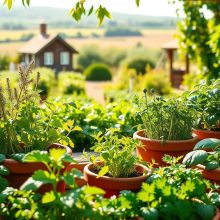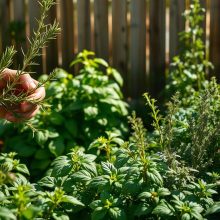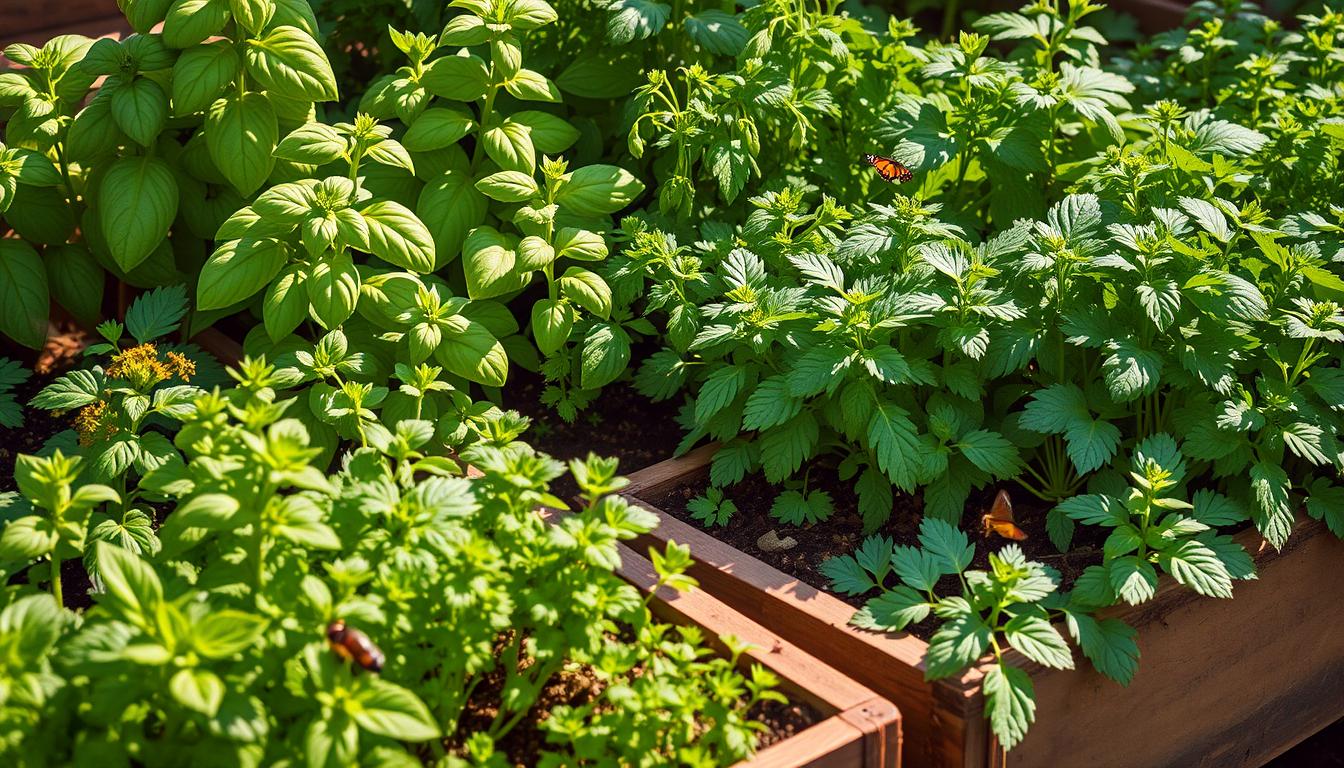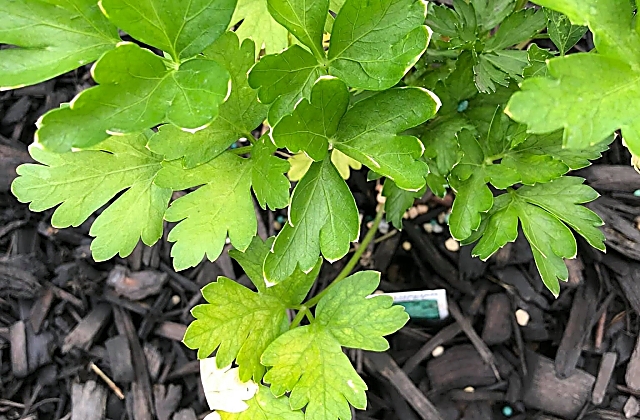The Benefits of Herb Gardening: A Guide
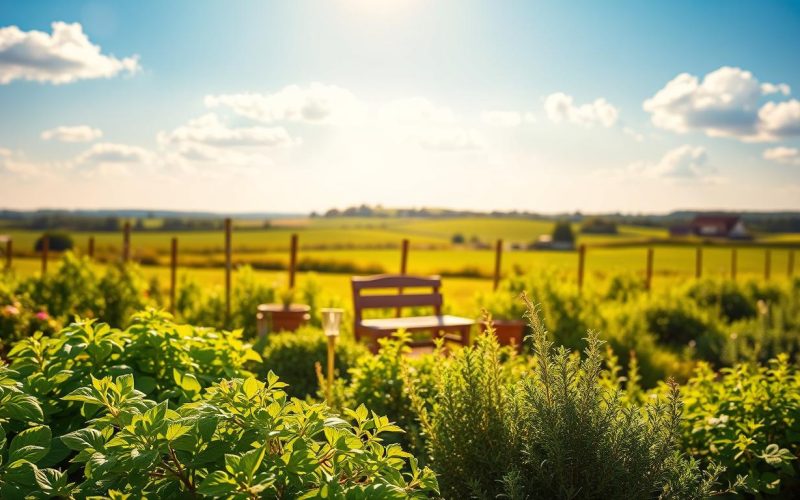
Herb gardening turns simple spaces into lively green havens full of taste and health. Growing your own herbs at home is a great way to make your cooking better and live more sustainably. These homegrown spices add fresh flavors to your meals and help you stay healthy.
Herb gardening is more than just cooking. It connects you with nature, saves money on groceries, and lets you choose the best ingredients. You don’t need a big yard to start. Even a small windowsill in your apartment can be a great place to begin.
Learning about herb gardening opens up new ways to be creative in the kitchen and make healthier choices. From basil to thyme, each herb adds its own special taste and health benefits to your cooking and life.
Key Takeaways
- Herb gardening provides fresh, organic ingredients
- Growing herbs reduces grocery expenses
- Homegrown spices offer superior flavor and nutrition
- Gardening promotes sustainable living practices
- Anyone can start an herb garden with minimal space
1. Introduction to Herb Gardening
Herb gardening is a world of flavors and green spaces for all. It turns small areas into lively spots of fresh herbs. These herbs can make your cooking better, improve your health, and brighten your home.
What is Herb Gardening?
Herb gardening is about growing plants that smell good and are good for you. You can start with a few herbs in pots, even if you have little space. These plants are not just tasty; they also offer many other benefits.
- Grow herbs in containers or garden beds
- Select plants suitable for your climate
- Require minimal space and maintenance
- Provide fresh ingredients for cooking
Why Start Your Own Herb Garden?
Starting an herb garden has many perks. It lets you grow your own organic herbs, saving money on grocery bills. Home-grown herbs taste better and are healthier than store-bought ones, giving you control over your food’s quality.
- Save money on fresh herbs
- Enjoy pesticide-free produce
- Experience the satisfaction of growing food
- Improve meal preparation with fresh ingredients
Herb gardening is a great way to start with plants. It’s fun and useful for both new and seasoned gardeners.
2. Health Benefits of Growing Herbs
Growing your own herbs is more than a hobby. It’s a way to improve your nutrition and health. Fresh herbs offer health benefits that store-bought ones can’t match. They boost your immune system and provide natural remedies.
Herbs do more than just taste good. They are full of nutrients and healing properties. Homegrown herbs have more vitamins, minerals, and active compounds than dried or processed ones.
Freshness and Nutritional Value
Fresh herbs have big nutritional benefits:
- They have more antioxidants
- They have more vitamins and minerals
- They taste better and keep nutrients better
Medicinal Uses of Common Herbs
Herbal remedies have been used for health for centuries. Many herbs have amazing healing powers:
- Basil fights inflammation and stress
- Rosemary helps brain health and memory
- Mint aids digestion and reduces nausea
- Thyme has natural antibacterial properties
Enhancing Your Diet with Herbs
Adding fresh herbs to your diet boosts nutrition. These plants can lower blood pressure, cholesterol, and prevent diseases like diabetes and cancer. Growing your own herbs is a smart way to improve your health.
3. Environmental Advantages of Herb Gardening
Sustainable gardening is more than just growing plants. Organic herbs help make a positive impact on the environment. By starting a small herb garden, you can help the planet and enjoy fresh, healthy food.
Promoting Biodiversity
Herb gardens are like tiny worlds that support local wildlife. Planting organic herbs creates a home for many beneficial insects and small animals. This variety of plants keeps the environment balanced.
- Supports local insect populations
- Creates microhabitats for small wildlife
- Increases genetic diversity in garden spaces
Reducing Carbon Footprint
Growing your own herbs cuts down on emissions from transporting store-bought produce. By growing herbs at home, you avoid packaging waste. This also reduces the carbon footprint of commercial herb production and distribution.
Attracting Pollinators
Organic herb gardens naturally draw in bees and butterflies. These important pollinators help keep our ecosystem balanced. They also support food production in our area.
- Provides nectar for bees
- Creates safe spaces for butterfly populations
- Supports overall pollinator health
4. Economic Benefits of Herb Gardening
Turning your backyard or kitchen windowsill into an herb garden is smart. It saves money and gives you fresh, quality ingredients. Growing your own spices and herbs cuts down on grocery bills.
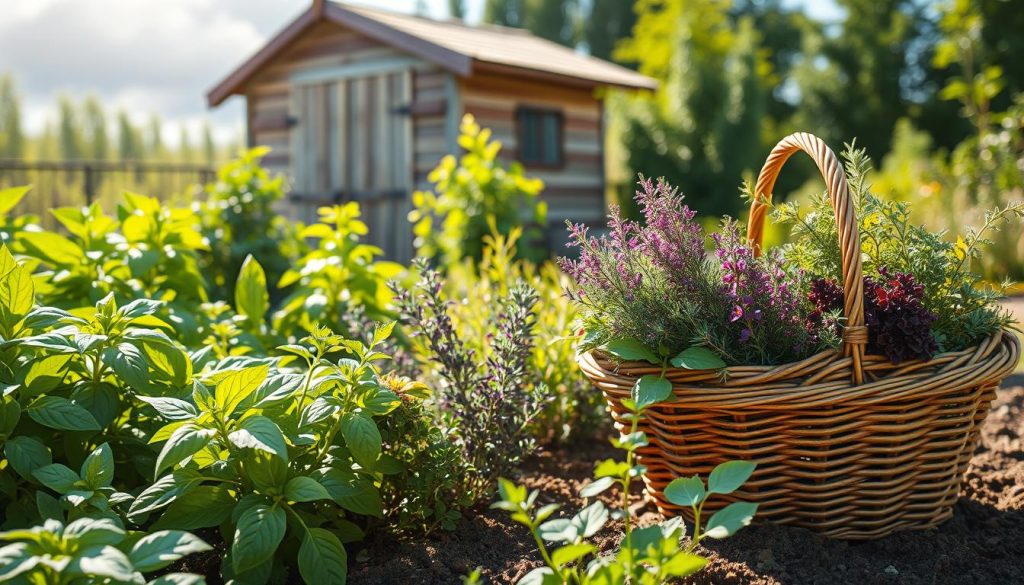
Herb gardening offers more than just saving money. It’s a smart way to grow your own food. Let’s look at how it can be a financially savvy choice:
- A packet of herb seeds ($2-$3) can give you months of fresh herbs
- Buying organic herbs from stores costs $3-$4 per small bundle
- Home gardens can save up to 70% on herb purchases each year
Cost Savings on Groceries
Buying organic herbs from stores can be expensive. Growing your own saves money and ensures freshness. Basil, cilantro, and parsley are great herbs to grow at home.
Potential Income from Selling Herbs
If you love gardening, you can make money from it. Local markets, restaurants, and stores want fresh, homegrown herbs. It’s a chance to turn your hobby into a small business.
Growing Your Own Organic Produce
Having your own herb garden means you know your herbs’ origin. You control the growing conditions, avoiding harmful chemicals. It saves money and gives you peace of mind about your food.
5. Versatility of Herbs in Cooking
Culinary herbs make simple meals into amazing dishes. Growing your own spices at home adds fresh flavor that store-bought can’t match. They’re magic because they boost any dish’s taste with just a little effort.
Homegrown herbs are more potent and taste better. They have more flavonoids, which fade fast after picking. So, for those who love cooking, growing your own spices is the best choice.
Common Culinary Herbs to Grow
- Basil – Perfect for Italian and Thai cuisines
- Rosemary – Ideal for roasted meats and vegetables
- Thyme – Excellent in soups and stews
- Cilantro – Great for Mexican and Indian dishes
- Mint – Versatile for both savory and sweet recipes
Flavoring Your Dishes with Fresh Herbs
Herbs can change your cooking in big ways. Add chopped herbs right before cooking to keep their oils and flavor. Try mixing herbs to find new tastes that will wow everyone.
Creative Uses for Herbs Beyond Cooking
- Herbal tea blends
- Homemade herb-infused oils
- Natural room fresheners
- Herb-based skincare products
- Decorative garnishes
Adding herbs to your garden and kitchen opens up a world of flavors and ideas. It’s a journey into the vibrant side of cooking.
6. Therapeutic Benefits of Herb Gardening
Herb gardening is more than just growing plants for cooking. It’s a way to improve your mental health and find personal healing. For those new to gardening, it can turn any space into a peaceful retreat.
Stress Relief and Mental Wellness
Working with herbs can really help lower stress. The benefits of herbs go beyond just health. Activities like planting and caring for herbs can be calming and improve your mood.
- Reduces cortisol levels
- Promotes mindfulness
- Provides a sense of accomplishment
Connecting with Nature
Herb gardening lets you connect with nature, even in the city. Growing herbs in small spaces can help you feel less alone. It boosts your emotional health.
The Joy of Nurturing Plants
Starting with herbs is a great way for beginners to enjoy gardening. Seeing your plants grow brings happiness and a sense of purpose. It creates a strong bond with your plants.
- Boosts mood and self-esteem
- Creates a sense of responsibility
- Provides a meaningful hobby
7. Gardening Techniques for Success
Growing herbs at home can be very rewarding. It’s all about knowing the right techniques. Whether you’re setting up an indoor herb garden or growing plants outside, you need to know how to care for them.
Learning about herb gardening is key to growing healthy plants. The right approach makes gardening fun and rewarding.
Basic Herb Gardening Tips
- Choose herbs that match your local climate and available sunlight
- Use well-draining potting soil designed for herbs
- Ensure your herbs get 4-6 hours of direct sunlight daily
- Water plants consistently but avoid overwatering
Container Gardening for Herbs
For an indoor herb garden, pick the right containers. Choose pots with drainage holes and think about the herb’s mature size. Terracotta and ceramic containers are great for keeping moisture right.
- Select containers 6-8 inches deep for most herbs
- Use lightweight potting mix for container gardens
- Place containers near sunny windows or under grow lights
Seasonal Considerations for Herb Gardening
Herbs grow best in certain seasons. Some, like basil and cilantro, love warm weather. Others, like parsley and chives, do well in cooler conditions. Switch up your herbs with the seasons to keep them growing.
- Plant warm-season herbs after the last frost
- Protect herbs during extreme temperature changes
- Consider indoor growing during winter months
8. Common Challenges in Herb Gardening
Growing organic herbs in a sustainable garden comes with its own set of challenges. To succeed, you need a solid plan and active management. This ensures your herbs grow well and you get a good harvest.
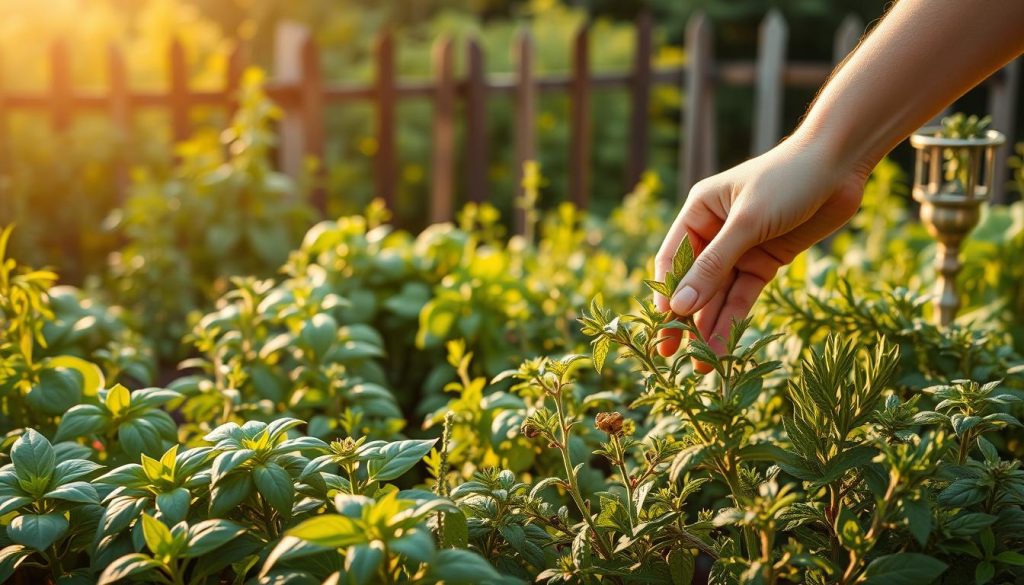
Pest Management Strategies
Keeping pests away from your herbs is key. You can use natural and safe methods:
- Use companion planting to deter harmful insects
- Introduce beneficial predatory insects like ladybugs
- Create natural pest repellent sprays using neem oil
- Implement physical barriers such as row covers
Weather Variation Techniques
Herbs are sensitive to weather changes. To protect them, you need to adapt:
- Utilize microclimate gardening techniques
- Implement mulching for temperature regulation
- Create temporary greenhouse structures
- Select herb varieties resilient to local climate
Soil and Nutrient Management
Good soil is vital for healthy herbs. You need balanced nutrients and proper drainage:
- Test soil pH regularly
- Add organic compost for nutrient enrichment
- Use natural fertilizers like worm castings
- Practice crop rotation to prevent nutrient depletion
9. Resources for Herb Gardeners
Starting to grow herbs at home is both thrilling and tough for beginners. Luckily, many resources are out there to help you on your herb gardening journey. They can also improve your skills.
It’s key to learn more when you’re just starting. Here are some great resources for your herb gardening adventure:
Recommended Books and Guides
- Find guides that focus on growing herbs
- Choose books from experienced herb gardeners
- Look for guides with easy-to-follow steps for growing herbs at home
Online Communities and Forums
Online platforms are great for herb gardening fans. Some top online resources are:
- Gardening forums
- Social media groups for herb lovers
- Websites with gardening tips from experts
Local Gardening Workshops and Events
Local spots offer hands-on learning for beginners. Check out:
- Community garden centers
- University extension services
- Botanical garden workshops
- Local nurseries with herb classes
These resources will boost your confidence and skills in growing herbs at home. They’ll turn your gardening journey from a beginner to a seasoned enthusiast.
10. Conclusion: Embrace Herb Gardening Today
Herb gardening is more than a hobby; it’s a journey to sustainable living. It offers many benefits, like improving health, enhancing cooking, and caring for the environment.
Herb gardening is easy for anyone, from city folks to country dwellers. It’s great for getting fresh ingredients, saving money, and connecting with nature. Everyone can grow a vibrant herb garden that’s good for you and the planet.
Your journey in herb gardening begins with one plant. Start small, try different herbs, and watch your garden grow. You’ll not only get better at cooking but also live more sustainably.
Choosing herb gardening means connecting with nature, helping local ecosystems, and being more mindful of your food. Every herb you grow is a step toward a greener, more intentional life.
